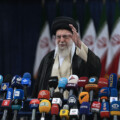I have been advocating for a serious conversation in the academy and media about the fact of the multipolar world, one in which the brief “unipolar moment” after the Soviet collapse passed around 2008, and which the hegemon refuses to acknowledge, as is usual in history. This has been widely discussed in books such as The Thucydides Trap but lacks anything like the attention it requires, especially in light of the Ukraine War.
The question is not whether we now live in a multipolar world (though America’s protagonists/apologists disagree), but how to manage the transition to multipolarity to avoid potentially calamitous consequences. We are not getting much help here from our media or academies that are deeply rooted in (and funded by) the status quo and its worldviews. They work to ignore the question from their pews in the cathedral.
During a recent visit to China, Vladimir Putin made two statements barely reported that speak directly to the core of our global political challenge. They appeared at the bottom of a Globe and Mail report, happily from its own reporter, and they speak to the core of the issue:
Putin said of Russia and China that, “Together we work toward a more just and democratic, multipolar world order,” one based on “cultural and civilizational variety and the measured balance of interests of all members of the international community.”
Nobel Prize please, nominated by every member of the BRICS. This is hotly opposed by the United States and its tribe, where President Biden wrote last year in his national security review that America would never accept the pre-eminence of any other power that did not share America’s values (“We will not leave our future vulnerable to the whims of those who do not share our vision”). This evangelical fatwa is clearly outrageous and constitutes the primary danger to international peace and security today—from America.
America bridles at any serious proposition that “cultural and civilizational variety” have any status—to the contrary. Nor does America believe that global peace is best secured by a “measured balance of interest of all members of the international community.” Rejected. America is expanding its military bases in the Pacific within just hundreds of miles of the Chinese coast.
The Monroe Doctrine has morphed into the Biden Doctrine which sees the entire world as America’s sole sphere of interest, meaning that any other emerging great power will be tightly corralled within its borders by military and economic force.
Some of you might applaud this American stance—it is clearly accepted by our visible support for American policies or, at least, our silence in riding along. But that is not where the wisdom of history lies, or where the morality of policy lies. Monroe’s declaration that the Western Hemisphere was America’s exclusive security and economic zone did not carry the evangelical gene now expressed in America’s stance—that anyone not sharing American values is unacceptable on a global scale. Otherwise, Biden’s untenable assertion of American dominance globally would rest solely on its classically self-defined material interests, very poorly defined indeed. America explicitly states now that it carries a version of the “white man’s burden” in global affairs expressed by the sophomoric “democracy versus autocracy” slogan.
Putin met with Xi in China and America is invests billions more in military alliances and capacities. Putin said Russia and China aim to build a “reliable and adequate security architecture in the Asia-Pacific region, with no place for closed military-political alliances.”
That sounds like boilerplate, but it speaks again to the core issue of multipolarity, which would comprehend that Asia-Pacific is bordered by two major powers—China and India—with Indonesia and Malaysia emerging. America’s Pacific looks out from California, thousands of miles away. Yes, America has interests in the Pacific, though less so in Asia, but it is folly to suggest that China, India, Russia, and others’ interests are not more proximate or legitimate.
America has worked hard recently to line up Japan, South Korea, the Philippines, and Australia behind its “closed military-political alliance” in the Asia Pacific. Rational premonition tells us that China will not accept this, as premonition told us that Russia would not accept America’s interventions in Ukraine from 2013-14 onward.
Multipolarity requires “strategic empathy,” which means the capacity to see the world from others’ points of view and interests. It requires skill sets that America lacks entirely these days, rooted in its military-industrial complex and corrupt financial political system, but more tragically among its intellectuals. The “treason of the intellectuals” comes not from their failure to stand with the evangelicalism of the hegemon in its demand to police the world, but rather in their complicity in America’s catastrophic version of the End of History, minds closed, story over.
The story never ends. The world goes on, and Mr. Putin put it into a few smart words again.
Recommended for You

Michael Bonner: Are we witnessing the last gasp of Iran’s Islamic Republic?

Need to Know: Yahoo, Alberta! You’re doing something right

‘He’s a master of globalization in a re-nationalizing world’: Michael Ignatieff on the domestic and geopolitical challenges facing Prime Minister Carney

Brian Lee Crowley: Why George Grant was wrong about pretty much everything




